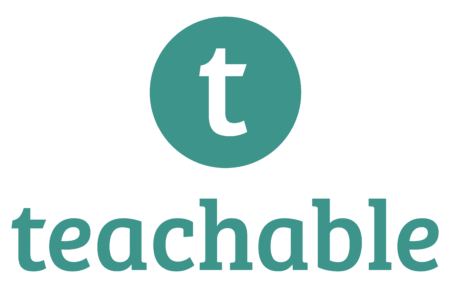A new phase in education has been initiated by the digital revolution, characterized by the increasing appeal of online learning platforms. These platforms have been instrumental in democratizing educational access, granting learners everywhere the chance to explore a wealth of knowledge and skills at their own pace. Amidst this transformative landscape, Teachable has emerged as a key player, offering unique value to educators and learners alike.
Teachable has distinguished itself in the digital education realm by concentrating on empowering content creators. Teachable allows for individuals and enterprises to easily create, manage, and dispense online courses and coaching services. Teachable is notable for its intuitive interface, extensive course creation and sales tools, and a dedication to supporting creators’ success. With the growing need for flexible and accessible learning options, Teachable’s platform becomes increasingly vital in enabling the transfer of knowledge and skills, narrowing the divide between experts and eager learners.

For those looking for a video based review, here is anoverview video of Teachable from the YouTube channel Nurturing By Marcus. However, if you want a more in-depth review, you can also read the whole article below.
Teachable Overview Teachable Vs Myquest
Key Features and Benefits
Teachable’s wide-ranging features, designed to make course creation smoother, render it a compelling option for both educators and entrepreneurs. Principal features involve a user-friendly course builder accommodating a broad spectrum of multimedia content, integrated payment processing for effortless transactions, and customizable course pages, permitting creators to synchronize their digital classrooms with their branding. Teachable also features potent analytics tools to assess student engagement and performance, assisting creators in optimizing their courses for enhanced results. The platform also facilitates the oversight of student interactions through embedded tools for quizzes, discussions, and feedback, amplifying the educational experience.
Target Audience and Ideal Use Cases
Teachable serves a vast audience of content creators, including lone educators, domain experts, small ventures, and major organizations desiring to present professional advancement opportunities. Teachable’s ideal applications range from enthusiasts teaching arts and crafts to experts providing certifications in fields like digital marketing. Teachable is uniquely appropriate for creators aiming for a platform dedicated to cultivating and advancing their online educational enterprises, with the capability to scale from a single offering to a complete online academy. No matter if it’s enhancing earnings, crafting a personal brand, or broadening an educational venture, Teachable presents an adaptable and user-friendly platform to address a range of e-learning needs.

>>Click Here to Try Teachable for FREE <<
Teachable vs. Kajabi
Kajabi asserts itself as a holistic platform, transcending simple course creation to integrate marketing, sales, and business management features. Designed for entrepreneurs and creators, Kajabi is ideal for those looking not merely to educate but to construct a thorough online business. Kajabi highlights include progressive course creation instruments, automated marketing initiatives, sales funnel builders, and extensive options for customization in branding. Kajabi is aimed at creators seeking a solid system to handle every component of their online course business, including content delivery and customer relationship management. Teachable Vs Myquest
Comparison of Teachable and Kajabi
- Course Development Tools: Teachable and Kajabi both excel in course creation features; however, Kajabi stands out with enhanced interactive and engagement tools in its courses, whereas Teachable prioritizes straightforwardness and user-friendliness, catering especially to beginners.
- Marketing Capabilities: Kajabi excels with its built-in marketing tools, including email marketing and sales funnels, designed to automate and optimize the sales process. Teachable offers basic marketing tools but lacks the depth of automation and integration found in Kajabi, making Kajabi the better choice for creators with extensive marketing needs.
- Pricing: Teachable provides a more affordable entry point with its free plan, albeit with transaction fees, and its paid plans are generally less expensive than Kajabi’s. Kajabi’s pricing reflects its comprehensive feature set, positioning it as a premium option.
- Navigability: Teachable is acclaimed for its navigable interface, easing the course setup and management process for its users. Kajabi, while still approachable, demands a deeper understanding owing to its comprehensive features and functions.
Pros and Cons of Teachable over Kajabi
Pros of Teachable:
- The platform’s pricing setup is more favorable, ensuring accessibility for a larger spectrum of content creators.
- The platform stands out for its straightforwardness and ease of navigation, making it an ideal choice for beginners and those who prefer a no-frills approach to course development.
- Focus on course creation and student engagement, with enough features for most course creators’ needs.
Cons of Teachable:
- Compared to Kajabi, this platform has fewer tools for marketing and sales, likely requiring supplementary third-party solutions for complex marketing strategies.
- The platform’s limited customization and automation features might hinder creators looking to grow their business on a larger scale.

>>Click Here to Try Teachable for FREE <<
Teachable vs. Udemy
Udemy is based on a marketplace concept, identifying as a wide-ranging online learning space where educators worldwide can craft and vend courses to an extensive audience of students. Its key strength lies in its extensive audience reach, offering a built-in user base for instructors. This model facilitates exposure for courses across a wide range of topics, making it an attractive option for educators seeking to tap into a large market without significant marketing efforts.
Differences between Teachable and Udemy
- Course Control: Teachable offers instructors full control over their course content, pricing, and student data. In contrast, Udemy sets course prices and often discounts courses significantly to attract students, which can affect the instructor’s revenue and control over their course’s market positioning.
- Revenue Models: Teachable allows creators to keep a larger portion of their sales, especially on higher-tier plans, charging a monthly fee for platform access but offering greater earning potential per sale. Udemy, however, operates on a revenue-sharing model, where instructors earn a percentage of each sale, which can vary depending on how students discover the course. Teachable Vs Myquest
- Marketing Autonomy: Teachable offers tools that allow creators to independently market their courses, such as email marketing and affiliate programs, thus enabling brand building. Udemy, however, centers its marketing within its platform, diminishing instructors’ direct influence on sales and their ability to establish a dedicated student base.
Advantages and Limitations of Teachable vs. Udemy
Advantages of Teachable:
- Enables educators to define the worth of their courses through considerable control over the content and its pricing.
- Thanks to clear pricing structures and reduced transaction fees, there’s a higher revenue potential for each sale.
- More independence in marketing and branding, enabling educators to build a direct relationship with their students.
Limitations of Teachable:
- Instructors have to work harder to bring in students, as they do not have access to the inherent audience that a marketplace provides.
- The required fees for accessing the platform monthly may deter educators, especially those who are just beginning.

>>Click Here to Try Teachable for FREE <<
Teachable vs. Podia
Podia is acclaimed for its direct and easy-to-navigate method for offering online courses, digital products, and memberships. Underscoring simplicity and a direct-to-consumer philosophy, Podia facilitates creators in quickly launching their products without the need to navigate complex features or elaborate setups. This platform is favored by those who seek ease of use and desire to focus on the creative and selling process, without the hassle of technical intricacies.
Comparison of Teachable and Podia
User Experience and Simplicity: Teachable and Podia shine with their straightforward interfaces, welcoming to course creators of all levels. Podia edges out with its more streamlined user experience, favoring beginners. Teachable, known for its user-friendly nature, demands slightly more effort to fully leverage its advanced customization capabilities.
Marketing Tools: Teachable provides a range of marketing tools, including affiliate programs, email marketing, and coupons, which are somewhat more developed than Podia’s offerings. Podia also supports email marketing and affiliate tools but tends to keep these features simpler, aligning with its overall approach to platform design. Teachable Vs Myquest
Pricing Models: Both Teachable and Podia utilize tiered pricing schemes. Podia’s notable for eliminating transaction fees across all its plans, offering a significant perk for newly selling creators. Teachable imposes transaction fees at its basic levels but compensates with an expanded array of features in its upper-level plans.
Pros and Cons Teachable Over Podia
Benefits of Choosing Teachable:
- If deep customization possibilities and a richly featured platform for enlarging their online course enterprise are priorities, creators might lean towards Teachable as the optimal solution.
- Teachable’s all-encompassing marketing tools offer creators various paths to publicize their courses and foster student engagement.
- The advanced analytics and reporting functions of Teachable provide creators with in-depth views into their course effectiveness and student interactions, supporting strategic planning.
Drawbacks of Choosing Teachable:
- Navigating Teachable’s comprehensive structure and its myriad features may present a more challenging learning experience than Podia’s more direct approach.
- Teachable’s transaction fees at lower pricing tiers can impact overall revenue for new creators who are just starting to sell their courses.

>>Click Here to Try Teachable for FREE <<
Teachable vs. Kartra
Kartra shines as an integrated marketing ecosystem, designed to support the multifaceted needs of online businesses such as course creators, digital marketers, and entrepreneurs. It unifies course hosting, email marketing, sales funnel creation, and CRM into a singular platform, positioning itself as a formidable resource for individuals seeking to manage all aspects of their online business in one place. The goal of this method is to make operations more efficient, intensify marketing activities, and increase sales conversions through the use of cutting-edge automation and analytics.
Analysis Teachable vs Kartra
- Creating Courses: Teachable shines in creating engaging and dynamic courses, providing a seamless interface, support for various media types, and tools for student involvement such as quizzes and certificates. Kartra, though offering course hosting capabilities, focuses more on its robust marketing and sales tools, making course creation functionalities somewhat secondary.
- Automation in Marketing and Funnel Creation: Kartra is superior in its marketing automation and sales funnel features, providing detailed tools for building complex funnels, automated emailing, and targeted marketing efforts. Teachable provides essential marketing tools but falls short of Kartra’s extensive automation and funnel construction options.
- Platform Ease of Use: Teachable is acclaimed for its straightforward and accessible design, ideal for those without a deep technical understanding. Kartra, possessing a vast range of functionalities, requires a bit more effort to master; designed for individuals versed in digital marketing principles or willing to engage deeply with the platform.
Pros and Cons of Teachable vs Kartra
Pros of Choosing Teachable:
- Uncomplicated Educational Platform: Teachable offers a straightforward platform, dedicated to facilitating education-focused course creation and student management, designed for the educator’s convenience.
- Simplified Course Creation: Teachable’s accessible interface enables swift course creation and deployment, streamlining the online course management process.
- Enhanced Educational Resources: Teachable provides focused educational tools, such as quizzes, certificates of completion, and mechanisms for student feedback, to elevate the learning experience.
Cons of Choosing Teachable:
- Limited Marketing Automation: Compared to Kartra, Teachable’s marketing and sales funnel capabilities are more basic, potentially requiring additional tools to implement advanced marketing strategies.
- Fewer Business Tools: Teachable focuses on course creation and delivery, lacking the extensive suite of business management tools that Kartra offers for handling broader aspects of an online business.

>>Click Here to Try Teachable for FREE <<
Conclusion Teachable Vs Myquest
The comparison between Teachable and platforms like Kajabi, Udemy, Podia, and Kartra highlights Teachable’s strength as a user-friendly, education-centric platform ideal for straightforward course creation and student engagement. Choosing the right platform depends on your goals: opt for Teachable for its straightforwardness and educational focus, Kajabi or Kartra for extensive online business features, Udemy for broad exposure with no marketing required, and Podia for a mix of simplicity and marketing features.
Teachable holds a prominent place in the market of online course platforms, appreciated for its user-friendly interface and emphasis on impactful learning experiences. Teachable delivers a pragmatic solution for those teaching to concentrate on content dissemination and student engagement. As the e-learning field grows, Teachable’s dedication to improving educational access and engagement positions it as a key player among content creators and learners.
